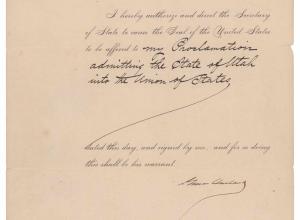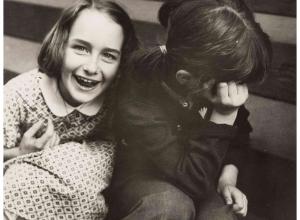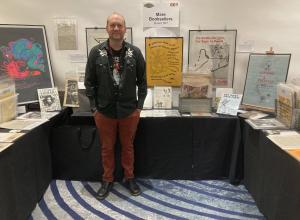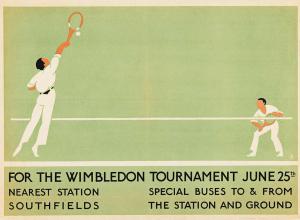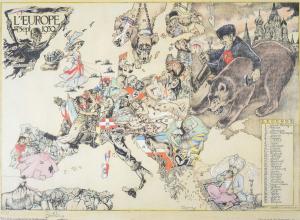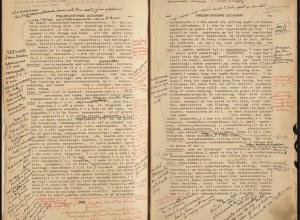Bright Young Librarians: Eva Guggemos
Our Bright Young Librarians series continues today with Eva Guggemos, Archivist and Special Collections Librarian at Pacific University in Forest Grove, Oregon.

How did you get started in rare books?
I got my first job in a library when I was a history graduate student at Yale. I worked part-time transcribing oral history recordings in the University Archives. I had been vaguely aware of the existence of special collections before then, but it had never occurred to me that I could have a career in them. Looking at what my boss was doing, though, it seemed like a great job. She was building collections, hosting conferences, running a web site and doing a lot of other fascinating things. I got my first full-time special collections job in the Acquisitions department of the Beinecke Rare Book and Manuscript Library, where I worked under E.C. Schroeder. He encouraged me to learn everything I could about the history of the book, bibliography and the rare book market. In that job, I got to see fantastic new acquisitions every day and fell in love with the field. Learning how to collate a book was a revelation! I went on to work as the Research Librarian at the Beinecke before moving to my current position on the West Coast.
Where did you earn your MLS/advanced degree?
I have an M.A. in History from Yale and an M.L.S. from Simmons.
What is your role at your institution?
I am the Archivist for Pacific University, which is a small school near Portland, Oregon. Since I am the only full-time professional in special collections here, I have a hand in most activities related to our archives and rare books. I spend a lot of my time running digital projects and facilitating access, outreach and metadata tasks. I also teach class sessions throughout the year related to primary source research. It is great to have so much variety in my work, though I often wish I had more staff to get it all done!
Favorite rare book / ephemera that you've handled?
What a difficult question! At Yale, I got to see a huge number of incredible books and manuscripts. One of my favorites was the 'Great Mirror of Folly', a folio compilation of satirical images about the South Sea Bubble of 1720, which was one of the world's first stock market crashes. At Pacific, our collection is much smaller but we do have a few gems. One of the most interesting the is the "Nez Perces First Book," published by a missionary press at Lapwai, Idaho, in 1839. It's thought to be the earliest surviving book printed in the Oregon Territory. Our copy has extra leaves from an even earlier printing used as pastedowns.
What do you personally collect?
I would like to become independently wealthy someday so that I could collect early modern French drama. I have a special fondness for pirated editions. In the meantime, I've started to get interested in collecting 19th century American photography. There are a lot of interesting examples available and they are still affordable.
What do you like to do outside of work?
I go camping as often as possible in the summer. During the school year, I try to keep up with my 9-year-old and (let's be honest) watch a lot of Netflix.
What excites you about rare book librarianship?
I love introducing students to rare books and manuscripts for the first time. A lot of people are used to thinking of books as just sources of text, rather than as material objects. Getting students to think about the physicality of the objects, how their past owners used them in their daily lives, how they wrote in them or pasted things into them or had them specially bound ... sharing all of those things that are outside the bare text is what is the most fun for me.
Thoughts on the future of special collections / rare book librarianship?
I think that being able to find and interpret primary sources like the ones we have in special collections is becoming increasingly important for many students. I would like to see rare book librarians position themselves as expert teachers on primary sources. We should use original materials in classes whenever possible. At small institutions like mine, though, we should be also ready and willing to teach with digitized collections from other institutions. There is now a critical mass of digitized rare books, manuscripts and other original material on the web, and access is being centralized into sites like the Digital Public Library of America. We should be the ones leading the charge to teach students how to find and use these sources in their research.
Any unusual or interesting collection at your library you'd like to draw our attention to?
Most people don't know that Pacific is one of the oldest universities on the West Coast, founded in 1849. When we started, there were no other schools, no stores and hardly even any roads in our area. I think more scholars could take a look at the early writings and records of our university to see how our founders thought they could create a college on the model of Harvard or Yale out in the middle of nowhere. I think there is a lot in these records that could be used to write about the history of the frontier, encounters with Native peoples and education.
[Suggestions for entries in our Bright Young Librarians series are welcome at nathan@finebooksmagazine.com]





